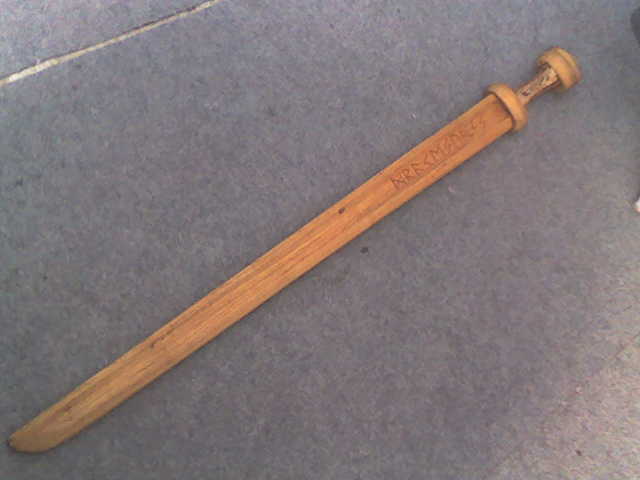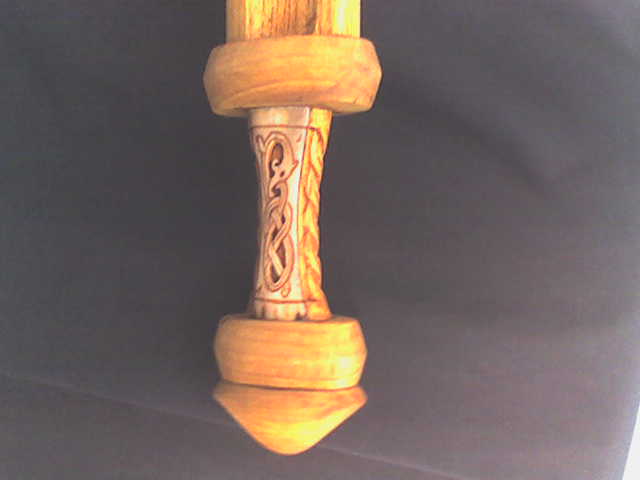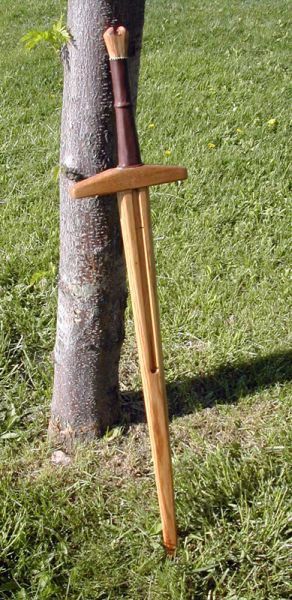Hey, folks
Was curious about suggested woods to be used in the creation of a waster, and perhaps any methods with the fewest materials to be used?
Can you get away with some solid glue and screws? Probably not, but any thoughts, let me know.
The kind I had in mind would be used primarily for form rather than striking.
Hello
I used a planed oak 1x8 for the pair of wasters I built, since it was the type of wood that was sturdy and readily available to me. I used a good quality wood glue to attach the crossguard, which is also supported against being pushed out of place toward the grip by a shelf that I left for it when cutting out the blade & grip piece. The crossguards on these are actually made of two pieces, but were glued to each other on the planed edges. A chisel and rasp were used to give the grip an ergonomic shape, and to round the edges of the blade a bit.
These wasters have not been tested to destruction, but they seem rather sturdy.
I used a planed oak 1x8 for the pair of wasters I built, since it was the type of wood that was sturdy and readily available to me. I used a good quality wood glue to attach the crossguard, which is also supported against being pushed out of place toward the grip by a shelf that I left for it when cutting out the blade & grip piece. The crossguards on these are actually made of two pieces, but were glued to each other on the planed edges. A chisel and rasp were used to give the grip an ergonomic shape, and to round the edges of the blade a bit.
These wasters have not been tested to destruction, but they seem rather sturdy.
I wouldn't use oak for wasters. It can work, but oak isn't resilient enough to hold up to serious stress in sparring. I recently bought some oak boards (for a seperate project) and even hammering nails into the oak was enough to put splits in the wood.
For that reason, I'd recommend hickory. It seems to be the best stuff out there, and all the decent quality wasters are made from it. As for making a waster: http://www.arma-ogden.org/content/view/7/30/
Edit: Even if you want a waster primarily for form, I'd still suggest using hickory. That way, you've got a sword that can be used for form and sparring. If you've got one made out of oak for form, you'll just have to make another one for sparring.
For that reason, I'd recommend hickory. It seems to be the best stuff out there, and all the decent quality wasters are made from it. As for making a waster: http://www.arma-ogden.org/content/view/7/30/
Edit: Even if you want a waster primarily for form, I'd still suggest using hickory. That way, you've got a sword that can be used for form and sparring. If you've got one made out of oak for form, you'll just have to make another one for sparring.
I'm making wasters out of ash. It's historical. Works well (it's the same stuff that baseball bats are made of). And easier and cheaper to get than hickory.
Not that hickory isn't also good . . . I just couldn't find any in the state that I live in (Massachusetts). :-P
Not that hickory isn't also good . . . I just couldn't find any in the state that I live in (Massachusetts). :-P
Last edited by Steven H on Sat 12 May, 2007 12:17 pm; edited 1 time in total
Ash is a great choice. It is splinter resistant as long as you don't pound it against end grain (like thrusting the tip abusively into a hard surface.) This is one of the reasons it is preferred for objects such as canoe paddles. It is a few percent lighter than hickory.
Most wasters seem a little on the light side (not much over 2 lbs.) I guess this is somewhat offset in terms of rotational speed/inertia since the usual weight of a wooden pommel (in relation to the wood blade weight distribution) is most often not as well balanced as in premium swords. I wonder if anyone has experimented with adding steel bands or more dense pommel weight to liven up their waster?
Most wasters seem a little on the light side (not much over 2 lbs.) I guess this is somewhat offset in terms of rotational speed/inertia since the usual weight of a wooden pommel (in relation to the wood blade weight distribution) is most often not as well balanced as in premium swords. I wonder if anyone has experimented with adding steel bands or more dense pommel weight to liven up their waster?
For my wooden wasters I drill a 3/8 inch hole down the end of the grip and add four or five 3/4 oz. lead 'torpedo' style fishing weights end-to-end. I've used the heavier (1.5 oz. each, but need wider hole) 'egg sinker' style weights also. This will add between 4 oz. and a half pound of weight on the back half of the grip and moves the point of balance back a little.
I, for one, like playing with lead also. If I make a disc pommel, I simply cut a lerge hole into the pommel, glue in a lead "cake" with epoxy, and then sandwich some kind of wood on the sides to get a good outlook. Anyway, be carfeul. If you apply too much weight, the result will be a big mass concentration on one end of your blade, holded only by a thin wooden beam. It can even break off in the abuse!
For that case, I drill a hole through the pommel into the center of the grip, and glue in an 8 mm steel rod. It also helps drawing back the COB a little bit.
BTW I also use the abovementioned "torpedo" but I apply it in the tip in cases when the waster would be too light, or I want to draw out the COP.
For the material, hickory is completely unaviable in my country, so I usually have to experiment with alternatives. Oak worked for me, as did maple. They can get some dents during the sparring, but they held up well as far. If you do not have a superior wood like hickory, most of the things depend on garin structure. Purchase a board with straight grain, saw it as parallel to the grains as possible, and you should get a good waister. That is my experience.
Hope this helps. Cheers!
PS. Here is some picture for thought provoking of one of my waisters. I chosen a wrong material for it, so now, it is just a wallhanger :confused: . Sorry for the bad resolution, but the pics had to be shot quickly.
 Attachment: 26.03 KB
Attachment: 26.03 KB

 Attachment: 18.3 KB
Attachment: 18.3 KB

The hilt is made of antler and walnut.
For that case, I drill a hole through the pommel into the center of the grip, and glue in an 8 mm steel rod. It also helps drawing back the COB a little bit.
BTW I also use the abovementioned "torpedo" but I apply it in the tip in cases when the waster would be too light, or I want to draw out the COP.
For the material, hickory is completely unaviable in my country, so I usually have to experiment with alternatives. Oak worked for me, as did maple. They can get some dents during the sparring, but they held up well as far. If you do not have a superior wood like hickory, most of the things depend on garin structure. Purchase a board with straight grain, saw it as parallel to the grains as possible, and you should get a good waister. That is my experience.
Hope this helps. Cheers!
PS. Here is some picture for thought provoking of one of my waisters. I chosen a wrong material for it, so now, it is just a wallhanger :confused: . Sorry for the bad resolution, but the pics had to be shot quickly.


The hilt is made of antler and walnut.
| George Torma wrote: |
| PS. Here is some picture for thought provoking of one of my waisters. |
That's a really beautiful piece - love the grip.
I have used Red Oak, as it was readily available, and have had no problems with splintering or breaking despite extensive use. Red Oak tends towards a more open cell structure, which lends to more crushing than splintering. White Oak on the other hand is very hard and dense but can create some truly wicked splinters. Neither is ideal for wasters, certainly, but as I said, it's what was at hand, and cared for and kept well oiled I've had no issues.
Besides, they are "wasters"... if it gets "wasted", I make another one.

I cast my own pommels out of pewter to get the weight right.. Additionally I use a thick piece of wood, planed to create distal taper and profile taper, so the forte is thick and durable and the foible is finer.
-Steven
-Steven
Page 1 of 1
You cannot post new topics in this forumYou cannot reply to topics in this forum
You cannot edit your posts in this forum
You cannot delete your posts in this forum
You cannot vote in polls in this forum
You cannot attach files in this forum
You can download files in this forum
All contents © Copyright 2003-2006 myArmoury.com — All rights reserved
Discussion forums powered by phpBB © The phpBB Group
Switch to the Full-featured Version of the forum
Discussion forums powered by phpBB © The phpBB Group
Switch to the Full-featured Version of the forum